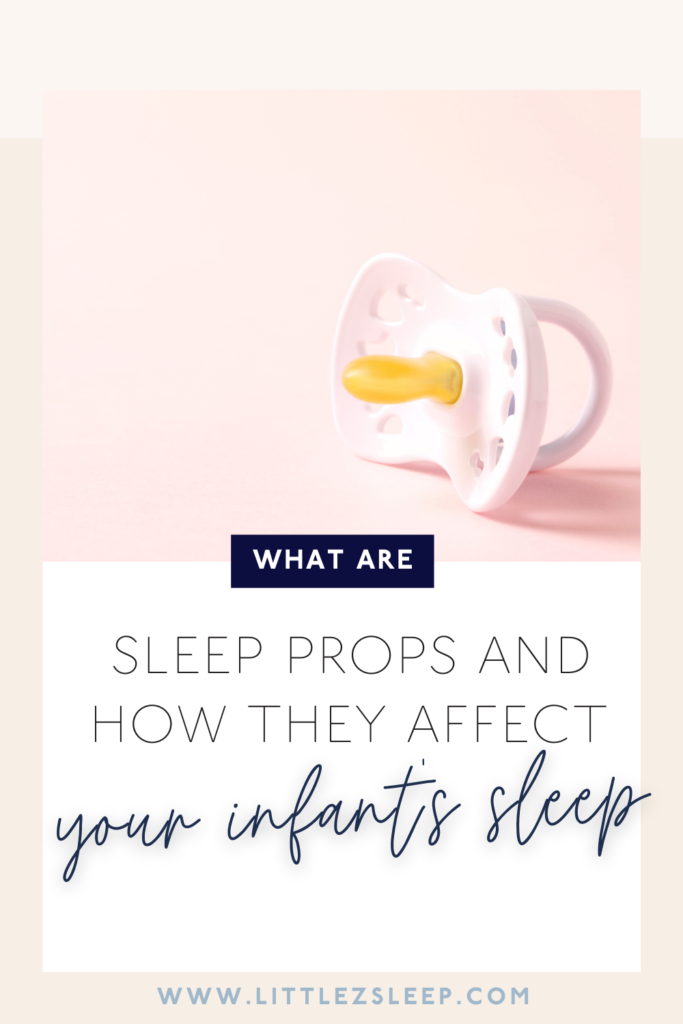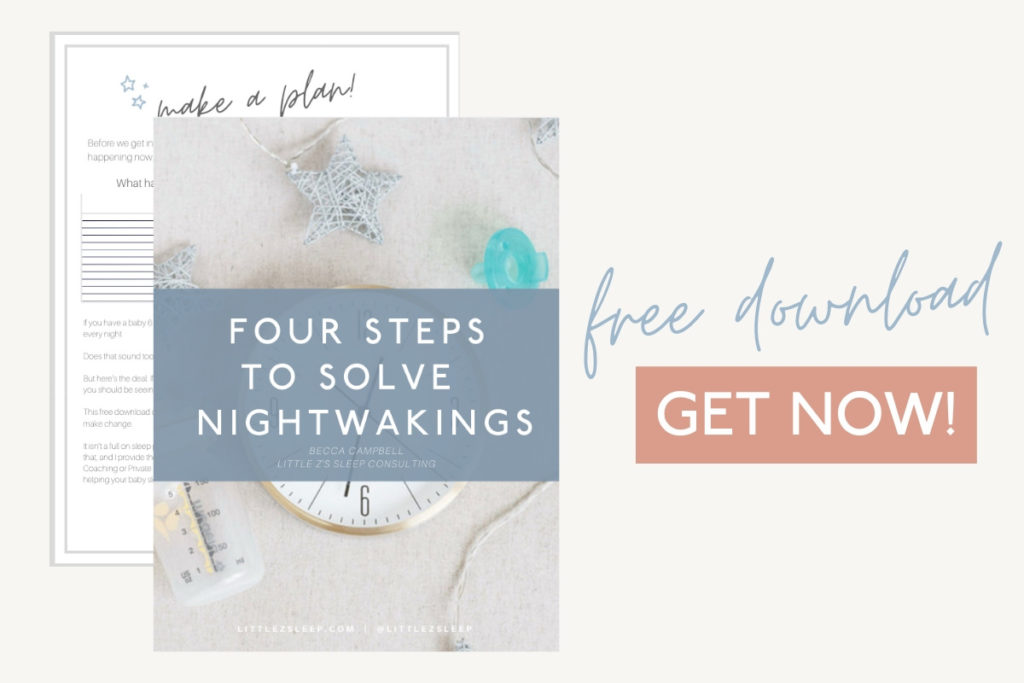Maybe you’ve heard your friends say things like, “What type of props does your baby use?” Or, you have been working with a sleep consultant, and they have asked you about your baby’s sleep props. You ask, “What does that mean???”
On the blog and in this video, I’m going to break down WHY sleep props are ruining your infant’s sleep AND which sleep props are safe to use. As a pediatric sleep consultant, I am committed to helping you raise happy, healthy, well-rested kids and resolve those exhausting sleep habits.
What in the world are sleep props?
Today, I am taking a step back. You see, sometimes I admit, I get caught in my brain as a sleep consultant. I’ve been a sleep consultant for over five years, and I’ve worked with hundreds of families for 1-on-1 consultations AND thousands of families have gone through our courses. Sleep training is second nature to me, but I really want to break down things that may sound foreign to you, like sleep props. And, I’m also going to be sharing an exclusive free guide for you guys to grab so you can finally ditch those infant sleep props and make sleep a thing once and for all.
So, what is a sleep prop?
A sleep prop is simply something that assists you—a baby, an adult, or anyone—to sleep.
Sleep props are objects or rhythms that help us to go to sleep. So, let’s just reflect on ourselves for a second. I have to have three things in order to sleep well that I would absolutely label as a prop: I cannot sleep without my pillow, a specific blanket, and my eye mask. It has to be totally dark for me to sleep. Those are my three sleep props. Those help me, and those are good, right? You’re probably thinking of all of the things that you have to have to go to sleep.
Child-Controlled VS. Parent-Controlled Sleep Props
Let’s break it down for babies, newborns, and toddlers.
There are two categories: sleep props that a child can control and sleep props that a child depends on the caregiver to provide to them.
In those two categories, can you guess which one I’m saying is best and which one to avoid? Obviously, props that your child can control are great because they are lifelong strategies. Parent-controlled sleep props are things that your child is depending on you to offer all night to re-assist them.
Sleep Props for Newborns
What are newborn sleep props? What are child-controlled and parent-controlled props? Guess what? Newborns get to have all the props! There is nothing wrong with a newborn relying on something to go to sleep because they are not developmentally ready to self-soothe. I do not teach breaking habits with newborns because all we are trying to do for a newborn is two things: eat and sleep.
There’s a lot you can do to soothe a newborn, and inside of our newborn course, I teach you every detail and strategy. But realistically, for example, pacifiers are needed because newborns have such a strong sucking reflex. They need to be able to have a pacifier to help them get drowsy, help them fall asleep, and help them connect sleep cycles. They also very much need you to comfort them through skin-to-skin, picking up and putting down, rocking, and more. I recommend all of these props with safe sleep practices.
What are some parent-controlled props for newborns? I would say co-sleeping and bed-sharing. When I say co-sleeping, I’m talking about bed-sharing with your newborn in bed with you. I do not teach co-sleeping because it’s very obviously unsafe (I was the mom who woke up with a newborn under my covers and that was the scariest moment EVER). I don’t want you to go down that trail because it’s so dangerous. If we’re talking about co-sleeping with a bassinet beside the bed—that’s great.
So if we’re looking at child-controlled and parent-controlled sleep props for newborns—the good: pacifiers, rocking, nursing, cuddling, holding, motion, sound, food, all of it! Everything is good for a newborn. The only thing to avoid would be bed-sharing.
Sleep Props for Babies
When I say baby, I mean the ages of 4 months through 16 months. Our newborn program is designed for zero to three months, but after four months, we are in the baby stage where there are definitely going to be some parent-controlled sleep props and habits that we want to avoid.
And before I share some of these bad habits, I am not here to judge or condemn, okay? So, if I go through some of these things and you’re thinking, “We’re using those, I didn’t think they were bad,” then don’t feel guilty! If it is working for you, and as long as they are safe sleep practices, then that is great!
With babies over four months, child-controlled sleep props are things your baby can offer themselves. Some examples are sucking on their fingers. I love when babies transition from the pacifier, which is now going in the “things to avoid” category, to sucking their thumbs. These are things they control because their fingers are always within reach (unlike the 10 scattered pacifiers around the crib).
I have an entire video on why I ditched the paci, so you can go check that out, but the pacifier goes from good as a newborn over to the things to avoid category at four months old. For babies, toddlers, and preschoolers, we no longer want to use a pacifier. That is something that they are depending on you to come help them with.
Child-Controlled Sleep Props for Babies
Rolling around on their own, rolling from belly to back and back to belly, that’s a developmental skill and that is a sleep prop, right? That’s something that your baby can control so it’s a good prop. Other good props would be sleep sacks, white noise, and total darkness. All of these things are good, and we have to have these in order to sleep well.
Parent-Controlled Sleep Props for Babies
So what are some sleep props in the things to avoid category? Essentially, anything your child needs you to help them with: pacifiers, rubbing, patting, and motions like rocking. You’re doing all the motion to help them go to sleep, and then what happens is they wake up throughout the night looking for the motion again. That’s a parent-controlled sleep prop.
Are night-feeds sleep props for babies?
What about feeds? Feeding in the middle of the night is totally acceptable for those young babies, but they don’t need to be waking up every single sleep cycle, right? What about nursing to sleep? Again, if it’s working for you and you’re happy, healthy, and well-rested, then great. If you are nursing or giving them a bottle all night long, and they’re using food for sleep, that is not sustainable. It is also going to affect your daytime feeds, I guarantee it.
<<Interested in learning more about our Baby Sleep E-Coaching? Learn more here.>>
Your baby can be in charge of their own sleep. We just have to give them the right tools. It equips them to have a fuller and better quality of sleep all night long without waking up all throughout the night and getting broken sleep that’s deteriorating to their health and wellbeing.
If you are ready to take the next steps, we have a free guide for you on four steps to help your child sleep through the night. You’ll receive four days of e-coaching in your email every day walking you through the next steps to help your child transition through night-waking without bad sleep props. This is not just any old PDF download, by the way. You actually get four days of me coaching YOU with a daily email!
<< Struggling with night wakings with toddlers and preschoolers? Read Part 2 here!>>
Sweet dreams, see you next time.
Becca Campbell
Your Pediatric Sleep Consultant
LOVE THIS? PIN IT FOR LATER!
FLASH SALE
ONE WEEK ONLY
Keep sleep a thing on vacation with the Little Z's Travel Guide!
